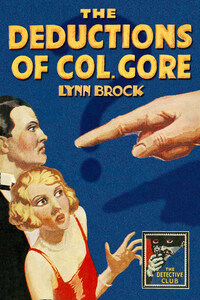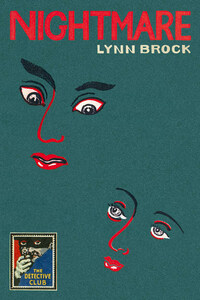‘THE DETECTIVE STORY CLUB is a clearing house for the best detective and mystery stories chosen for you by a select committee of experts. Only the most ingenious crime stories will be published under the THE DETECTIVE STORY CLUB imprint. A special distinguishing stamp appears on the wrapper and title page of every THE DETECTIVE STORY CLUB book—the Man with the Gun. Always look for the Man with the Gun when buying a Crime book.’
Wm. Collins Sons & Co. Ltd., 1929
Now the Man with the Gun is back in this series of COLLINS CRIME CLUB reprints, and with him the chance to experience the classic books that influenced the Golden Age of crime fiction.
COLLINS CRIME CLUB
An imprint of HarperCollinsPublishers Ltd
1 London Bridge Street
London SE1 9GF
www.harpercollins.co.uk
First published in Great Britain by
W. Collins Sons & Co. Ltd 1924
Published by The Detective Story Club Ltd 1930
‘Too Much Imagination’ published in Flynn’s magazine 1926
Introduction © Rob Reef 2018
Cover design © HarperCollinsPublishers Ltd 1930, 2018
Lynn Brock asserts the moral right to be identified as the author of this work.
A catalogue copy of this book is available from the British Library.
This novel is entirely a work of fiction. The names, characters and incidents portrayed in it are the work of the author’s imagination. Any resemblance to actual persons, living or dead, events or localities is entirely coincidental.
All rights reserved under International and Pan-American Copyright Conventions. By payment of the required fees, you have been granted the non-exclusive, non-transferable right to access and read the text of this e-book on screen. No part of this text may be reproduced, transmitted, down-loaded, decompiled, reverse engineered, or stored in or introduced into any information storage and retrieval system, in any form or by any means, whether electronic or mechanical, now known or hereinafter invented, without the express written permission of HarperCollins.
Source ISBN: 9780008283001
Ebook Edition © November 2018 ISBN: 9780008283018
Version: 2018-08-24
Contents
Cover
Title Page
Copyright
Introduction
Chapter I
Chapter II
Chapter III
Chapter IV
Chapter V
Chapter VI
Chapter VII
Chapter VIII
Chapter IX
Chapter X
Chapter XI
Chapter XII
Chapter XIII
Chapter XIV
Chapter XV
Chapter XVI
Chapter XVII
Chapter XVIII
Chapter XIX
Chapter XX
Chapter XXI
Chapter XXII
Chapter XXIII
Chapter XXIV
Chapter XXV
Chapter XXVI
Chapter XXVII
Chapter XXVIII
Too Much Imagination
Chapter I. Into the Net
Chapter II. Too Much to Swallow
Chapter III. The Note in her Hand
Chapter IV. Gore is Frank
Chapter V. Bloodstained Linen
Chapter VI. Arling Makes a Confession
Chapter VII. Tastes of a Secretary
Chapter VIII. Spain Waxes Vehement
Chapter IX. What Really Happened
Also by Lynn Brock
The Detective Story Club
About the Publisher
ALEXANDER PATRICK MCALLISTER’S literary career had had a very promising start. Born in Dublin in 1877 and educated at Clongowes Wood College, he later obtained an Honours Degree at the Royal University and was appointed chief clerk shortly after the inception of the National University of Ireland. His stage plays Irene Wycherly (1906) and At the Barn (1912), both written under the pseudonym Anthony P. Wharton, became great successes both in London and on Broadway.
Following these two hits, McAllister continued to write, but none of his subsequent plays could revive his early fame. He and his wife Cicely moved from London to Guildford, where they were to run a pub called The Jolly Farmer, and at the age of 46 he wrote his first detective novel, The Deductions of Colonel Gore (1924), under the pseudonym Lynn Brock. By this time, his early fame as a playwright had faded and he appears to have turned his hand to crime fiction simply to improve his finances at a time when detective books had begun to outsell all others. Nevertheless, the book was sold to William Collins in the UK and Harper & Brothers in the US, and became so successful that ‘Lynn Brock’ lived on to publish thirteen detective novels, seven of which featured his titular hero-detective Colonel Wickham Gore.
Brock’s complex plots and witty style won the praise of many critics including Dorothy L. Sayers and S. S. Van Dine, and his mysteries were often reprinted and widely translated. Despite their fame, however, the novels slid into obscurity shortly after the end of the Second World War—unjustly, some might suggest. Several recent reviews have criticised his novels as cliché-studded, dull affairs overloaded with Golden Age formulas and stereotypes. These reviews have missed the point: Brock actually played his part in the creation of those classic detective fiction patterns now so familiar and dear to us. He wasn’t a mere imitator of the genre, but rather experimented with existing formulas long before they became formulaic.









